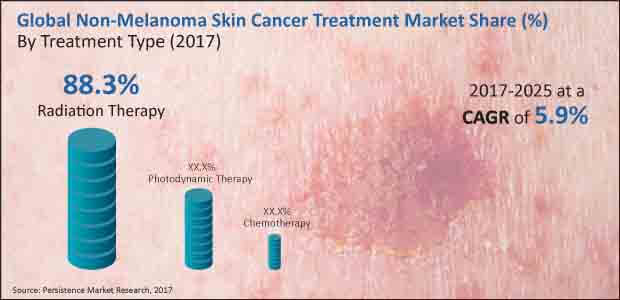Non Melanoma Skin Cancer Market 2022
In a new report titled ‘Non-Melanoma Skin Cancer Treatment Market: Global Industry Analysis 2012 – 2016 and Forecast 2017 – 2025,’ Persistence Market Research analyzes the global non-melanoma skin cancer treatment market over an eight year forecast period 2017 – 2025 and throws light on the various factors impacting revenue growth of the market over the said period. The report highlights the market forecasts for the different segments and presents deeper insights for informed decision making.
Get Sample Copy of this Report@ https://www.persistencemarketresearch.com/samples/3648
Company Profiles
- Almirall SA
- Boehringer Ingelheim GmbH
- Bristol-Myers Squibb Company
- Eli Lilly and Company
- Elekta AB
- F. Hoffmann-La Roche Ltd.
- Merck & Co., Inc.
- Novartis AG
- Mylan NV
- Sun Pharmaceutical Industries Ltd.
- Varian Medical Systems, Inc.
- Sensus Healthcare
- iCAD, Inc.
- Accuray, Inc.
- Ion Beam Applications SA
- Others.

Request for Methodology@ https://www.persistencemarketresearch.com/methodology/3648
Region – High Prevalence of Non-Melanoma Skin Cancer in North America
North America is estimated to hold a market share of roughly 55% in the global non-melanoma skin cancer treatment market in 2017 and is anticipated to have the highest attractiveness index of 3.0 during the forecast period. Non-melanoma skin cancer is more prevalent in senior citizens and the Population Reference Bureau estimates that Americans over the age of 65 will double to almost 100 million by 2060.
Treatment Type – Radiation Therapy Larger than Chemotherapy and Photodynamic Therapy
Radiation therapy is larger than chemotherapy and photodynamic therapy combined, making it imperative for key stakeholders in the non-melanoma skin cancer treatment market to focus on this treatment type. Radiation therapy is poised to be worth more than US$ 4.7 Bn by end 2025. Within radiation therapy, companies may wish to target superficial radiation therapy.
Indication – Basal Cell Carcinoma Dominates the Non-Melanoma Skin Cancer Treatment Market
Even though squamous cell carcinoma is predicted to record a higher CAGR of 6.4% from 2017-2025, it is unlikely to outpace basal cell carcinoma anytime soon as the latter is likely to value at approx. thrice the size of the former by end 2025. The attractiveness index of basal cell carcinoma is 1.5, considerably larger than the 0.5 of squamous cell carcinoma during the same period.
End User – Hospitals Popular Channel in the Non-Melanoma Skin Cancer Treatment Market
The treatment modalities for non-melanoma skin cancer usually require expensive radiation therapy. Therefore, hospitals are preferred over ambulatory surgical centers and specialty clinics in the non-melanoma skin cancer treatment market. The hospital segment is expected to reach a value of US$ 2 Bn in 2017 itself.
Access Full Report@ https://www.persistencemarketresearch.com/checkout/3648
Key Findings of the Non-Melanoma Skin Cancer Treatment Market Report
Non-melanoma skin cancer places a high economic burden on countries with minimal medical treatment options, particularly at the metastatic stage. Many pharmaceutical companies are now trying to develop treatment options for late-stage non-melanoma skin cancer. In addition, companies seek to use their existing drugs to effectively tackle squamous cell and basal cell carcinoma. Major players such as Bristol-Myers Squibb, Genentech, and Merck are working on gaining approval for their drugs to treat non-melanoma skin cancer.
Regulatory authorities and governmental bodies worldwide are adopting a number of cost-containment measures in the developed world. They are shifting from a volume to value-based system and this is driven by steps taken by life sciences companies and governments. The measures include profit and risk sharing, outcome-based pricing, competitive tendering, and price control.
The value-based healthcare system strives to achieve maximum value for every dollar spent on healthcare and improve outcomes by way of integrated care pathways. The system simultaneously levies pricing pressure on medtech and biopharmaceutical companies and could potentially impact R&D investment in crucial, lifesaving medical treatment technologies in the long run.
About us: Persistence Market Research
Contact us:
Persistence Market Research
Address – 305 Broadway, 7th Floor, New York City, NY 10007 United States
U.S. Ph. – +1-646-568-7751
USA-Canada Toll-free – +1 800-961-0353
Sales – sales@persistencemarketresearch.com
No comments:
Post a Comment